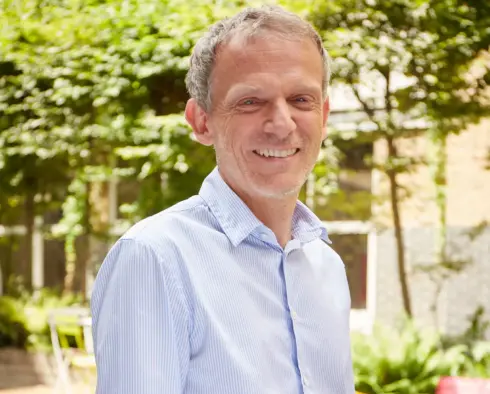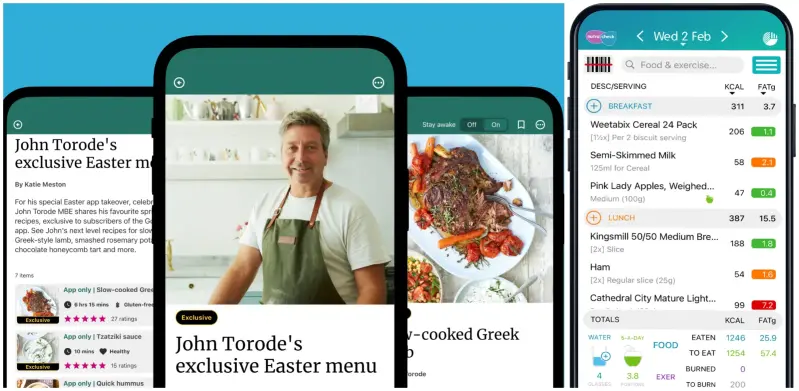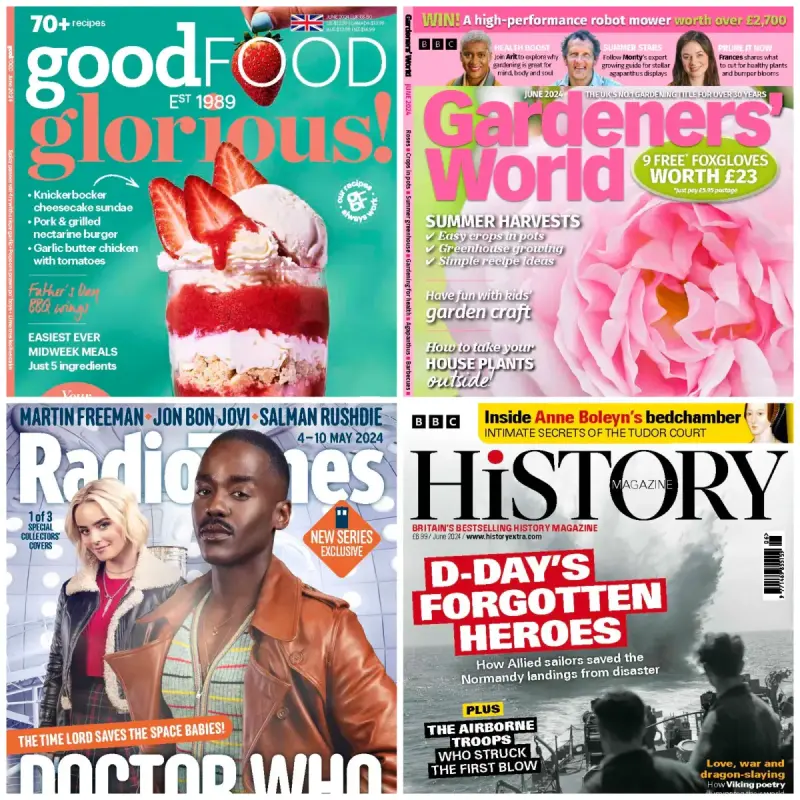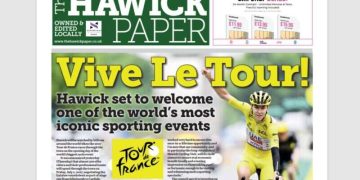
The boss of Immediate Media has said he believes publishers with fewer but larger brands will fare better in the age of generative AI and “infinite content”.
Sean Cornwell, who became CEO in June last year after a stint as platforms chief executive with responsibility for Immediate’s digital businesses, told Press Gazette it is a “really hard” time “to be in the long tail”.
Immediate Media, which has been part of German magazine giant Hubert Burda Media since 2017, has pivoted away from special interest titles to a “focus on big category leading brands that our audiences love”.
Immediate’s former specialist brands based in Bristol include Cycling Plus, Mountain Biking UK, Simply Sewing, Simply Knitting, Simply Crochet, Home and Antiques, Gardens Illustrated, BBC Wildlife, BBC Countryfile Magazine and BBC Music Magazine.
These brands were separated from the rest of Immediate Media in 2021, rebranded as Our Media in 2022 and eventually fully sold last year.
Cornwell, a former chief exec of Direct Ferries and chief digital and marketing officer of currency exchange Travelex, told Press Gazette: “They’re much better equipped to make a success of those businesses and those brands and it gives us the ability to focus purely on our large category-leading brands and core verticals.”
Radio Times and Good Food are the two biggest businesses within Immediate Media. Now in third place is calorie tracking app Nutracheck, which has been integrated with Good Food in a “light touch” way since its 2022 acquisition and has grown by more than 50% in terms of both revenue and subscribers in that time.
The focus of Immediate’s strategy, Cornwell said, is around “three mega verticals, so food and nutrition, entertainment, and knowledge. And we’re very much very deliberately focused around having a smaller number of large category brands”.
Cornwell said he believes this strategy will protect the publisher as generative AI continues to roll out and anyone can create content more easily than ever before.
“We’re fast approaching a world where basically there’s infinite content,” he said. “Anyone can create it in any format, repurposing content that’s already out there. So how do you stand out? What is the value proposition of your offering? And I think it comes down to two things.
“One is brand. And so having large category-leading brands that people know and trust, and are known for high quality, premium content, is critical.
“I think the other piece of it is around talent. Because increasing numbers of users, readers don’t follow a brand, they follow talent and that’s where their loyalty lies.”

Cornwell added: “I think where it’s heading to right now, and that may reverse again in a few years’ time, but where it’s heading now it’s a really hard place to be in the long tail.
“They’re the ones who are suffering most with Google’s algorithm changes, it’s harder to attract commercial partners and advertising dollars. And they’re the ones, I think, most susceptible to AI-driven search results and this world of infinite content that we’re heading to.”
Immediate Media CEO predicts micropayments for Google AI overview sources
Cornwell, who earlier in his career spent three years at Google as group product marketing manager EMEA, was speaking shortly after Google announced it would begin its full rollout of AI overviews in search results in the US.
Some publishers have expressed fears this will drastically reduce clickthroughs to their websites from Google – although SEO expert Barry Adams said this week he predicted while there will be a negative impact it won’t be a “dramatic downward dive”.
Cornwell described himself as “optimistic about it”, predicting the addition of micropayments so publishers are rewarded when users are shown information sourced from their websites.
He said: “We obviously spend a lot of time thinking about it but I think that brand and talent are definitely the places to be and are a good moat which is a safer place to be from AI-generated content. And I think also these things take a very, very long time to play out.
“I think that Google has to tread very carefully in terms of what it does, and it can’t bite the hand that feeds it. And as the regulators are making all too clear to the platforms and to Google in particular, they have societal responsibilities.
“Where this seems to be clearly heading is a place where actually content creators will get recognised and commercially paid probably through some form of aggregated micro payments for every time that their content is used within an AI-generated piece of content or response…
“So if you know OpenAI when it’s creating a recipe has actually relied heavily on Good Food, then based on how many times that is happening, you get paid for that. Then, in a way, it’s not too dissimilar to a click from Google and you’re getting ad dollars. It’s different, there’s a lot to be worked out, but I think you can see a world where that might work.”
Immediate Media subscriptions: Digital overtakes print
Immediate’s business is based on the two “core commercial pillars” of subscriptions and advertising.
The business now has 1.1 million subscribers. Digital subscriptions recently overtook print to make up more than half that number, down partly to organic growth and partly through M&A.
Good Food now has “more subscribers than it’s ever done in its whole history”, Cornwell said, adding that it is about 50/50 print and digital.
Cornwell said digital subscriptions – mostly meaning subscription apps and paywalls, with digital magazine editions making up a tiny amount – have grown from a “standing start” around three-and-a-half years ago. In the lead-up to that, print subscriptions saw a notable boost during the Covid-19 pandemic.
Despite falling circulations – in 2023 Radio Times was down 12% year-on-year, Good Food was down 14% and BBC History was down 12% – Cornwell said print “continues to be really important and do well – in the medium and long term, we feel pretty good, actually, about print.
“I think there can be sometimes too much doom and gloom around it,” he said.

All Immediate titles now have fully integrated print and digital teams. In September, to mark the centenary of the still “highly profitable” Radio Times, co-editor Tom Loxley told Press Gazette the editorial teams for the magazine (then 45 people) and website (15) were separate although they shared some content. However Cornwell said they have since been “unified” as part of a “move away from this concept of channels, and print and digital specifically”.
He explained: “That’s actually more reflective of our readers’ and users’ habits. If you read the Radio Times magazine, you don’t live in a print bubble, you also have a very active digital life and it’s incumbent on us to figure out how we provide you a relevant digital service and having two distinct teams is actually just not helpful.”
He added: “Each piece of content now needs to be created with multiple formats in mind. So if you’re doing an interview for a big feature in Radio Times, it can also form a podcast, how do you get video clips out of it, how does it turn into an online piece as well? How do you create little snippets for some of the social platforms, how do you syndicate it to Apple News and other platforms, and so on and so forth. So one piece of content suddenly has multiple lives in different shapes and forms. And if you have two teams, you can’t really do that.”
Advertising up 15% and bucking trends
Meanwhile despite a tough advertising market in which growth is going to the big tech platforms rather than publishers, “pretty much all” parts of Immediate’s ad business are growing.
Cornwell said it has had a “fantastic couple of years” with the ad business growing by around 15% last year and in 2024 so far.
“We know we’re outperforming the market strongly, we’re taking share, which is great,” he said. “And we feel good about it. We’re also unlocking ever larger partnerships particularly across our food and entertainment businesses as we offer more and more of an integrated approach to our ad partners.”
The business has benefited from BBC Good Food dropping the BBC association, meaning it no longer had certain guardrails on what it could do commercially.
“That’s added momentum in the last few months to our food business from an advertising perspective because we can offer more interesting, more creative, more innovative solutions to them than we could previously,” Cornwell said.
Asked what other factors had made Immediate beat the advertising trends, he added: “We have a phenomenal team. That’s one thing. I think, too, we’ve invested a lot in our ad tech over the last couple of years, and that’s really bearing fruit and giving us a lot more flexibility and creativity in what we can offer to our advertising partners.
“And then I think that in an uncertain market, which we’ve been in in the last couple of years… then I think that advertisers naturally gravitate to those larger category-leading brands because they know they’ve got the scale, they’ve got the trust, they’re safer places to be. And so that trust that we have, allied with the creativity and innovation that we’re bringing to it, I think are quite a powerful mix.”
Several new ‘multi-million’ revenue streams
Cornwell said Immediate has “built several completely new seven figure revenue lines” in recent years, including in podcasting and Apple News as well as digital subscriptions which all began life in the history business.
“There’s a lot of innovation happening across the group and a lot of that is happening in our smaller brands,” Cornwell said. “Sometimes it’s easier to incubate ideas and test things and move faster when you’re a smaller team.”
Immediate’s podcasts are now a “comfortably” seven-figure revenue business and, including History Extra, BBC Gardeners’ World, Good Food and Radio Times, have collectively reached 250 million downloads.
The majority of listeners are free and monetised through advertising but there is also a “growing subscription arm” approaching 20,000 paying subscribers.
The business has continued to develop since 2022 when Press Gazette heard the History Extra podcast, a sister brand to Immediate’s BBC History magazine, was on track to double revenue to £1m thanks to a boost in listenership and therefore advertising, as well as its new paid-for option.
Meanwhile Apple News has become “quite a material revenue line”, Cornwell said, and “increasingly significant for a number of our brands”.
Semafor similarly reported that Apple News is expected to bring in $3m to $4m for The Daily Beast this year while it delivers seven-figures of revenue for Time magazine each year.
Apple News is the most-used news app in the four territories in which it is available (the UK, US, Canada and Australia) with an audience of 13.5 million people in October. Users who pay £12.99 per month get access to hundreds of magazines and newspapers and publishers are paid by Apple according to time spent with their content.
“Essentially it’s syndication but it’s not pure syndication, you’ve got to think about the content and the format and what Apple News subscribers want,” Cornwell said.
Nearly 150 live experiments in AI
Other innovation is coming in the form of AI, which Cornwell said is now being used by 70% of Immediate Media staff in the course of their day-to-day work.
This includes someone in product or technology using coding assistant Github Copilot or editorial staff taking a piece of content from one format to another, translating it, or getting help with the initial ideation and drafting.
There are also ongoing user-facing experiments being shown to subsets of users. Cornwell said testing has included “more personalised solutions around things like meal planning” as well as chatbots trained on Immediate’s own content which could answer domain specific questions.
“I think at last count we had nearly 150 live experiments within the group going on,” Cornwell added. “So it’s everywhere.”
In 2022 Immediate Media was named the fourth best place to work in the UK by employer review platform Glassdoor.
When summarising the company strategy, Cornwell highlighted the “people-first culture”, adding: “Fundamentally I believe, and Immediate has always taken this perspective, that if you get the culture, right, and if you focus and invest in that, and if you get the audience and customer experience right, then business results will flow from that.”
Asked to share lessons about building a good culture that may help other publishers, Cornwell said: “No culture can be static, you’ve got to constantly evolve it and keep it fresh and alive.
“I think, honestly, the most important thing and the biggest kind of measure, is how much time you spend thinking about it, talking about it, not just as a leadership team, but throughout with your people and throughout the organisation. How much do people feel invested in it?
“I think there’s a couple of core beliefs which underpin it. Firstly, it’s that it really drives business performance, but also that to get the best out of people and actually to create an environment that everyone from myself down likes coming into every day – people have to be able to be themselves, to bring their whole selves to work, if they want to, and create an environment that they like being in, that celebrates success, where they feel there’s a degree of trust and psychological safety, and where people feel proud to be part of it.
“At the same time, you know, it helps if you’re successful – people always like being part of a winning team, right?”
The post Immediate Media CEO: Talent and brands will win out in world of infinite content appeared first on Press Gazette.





























